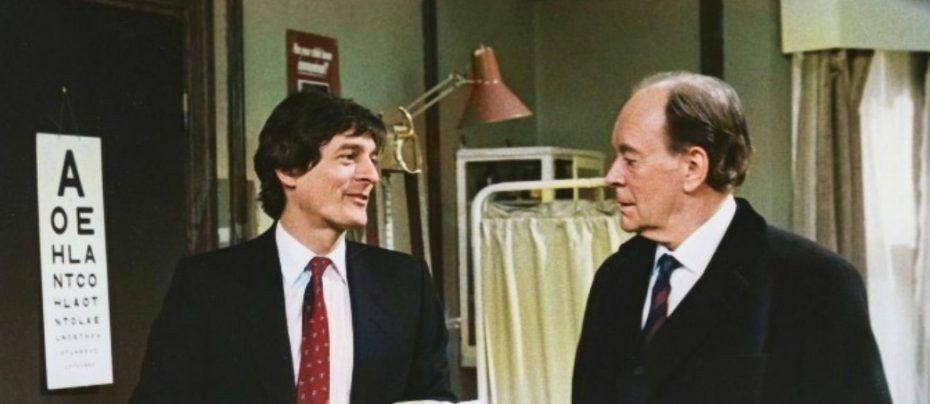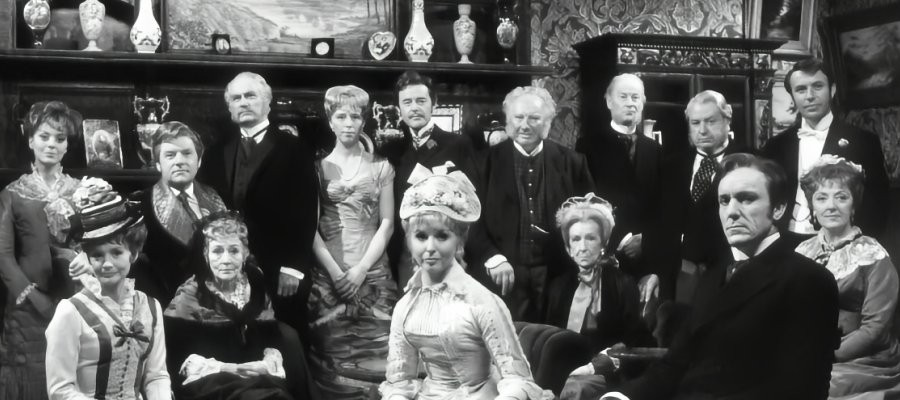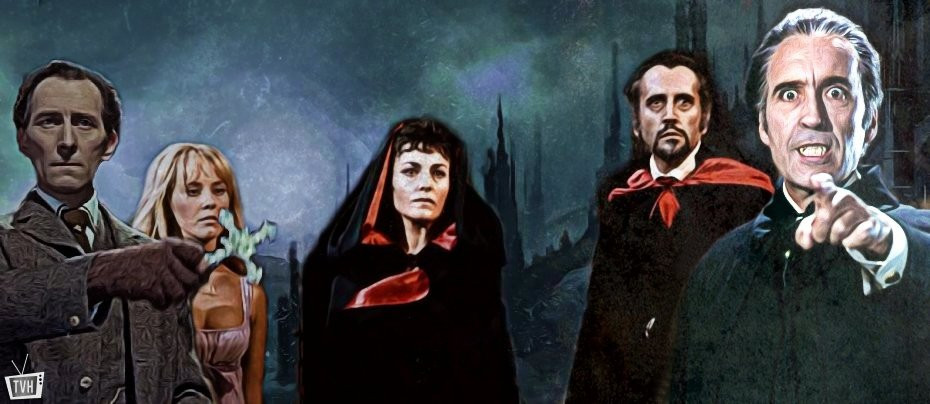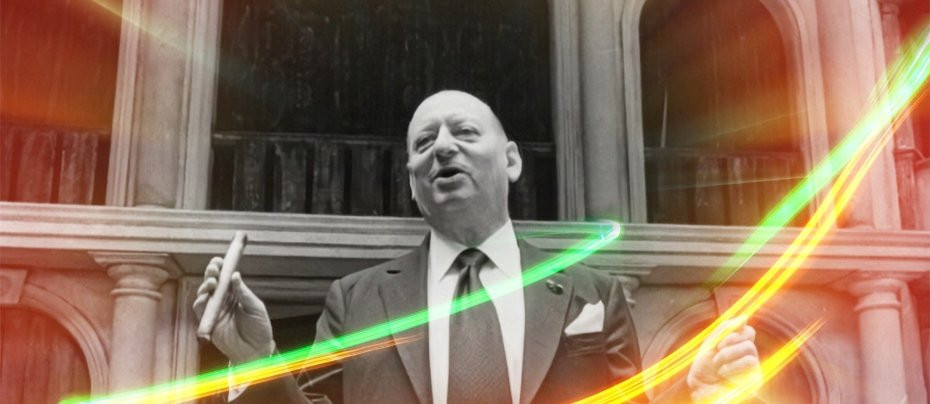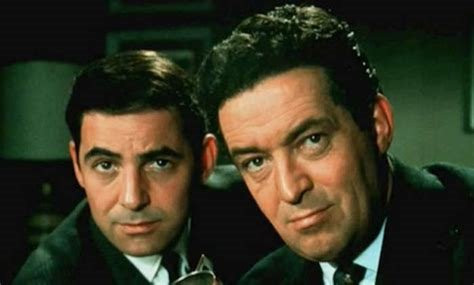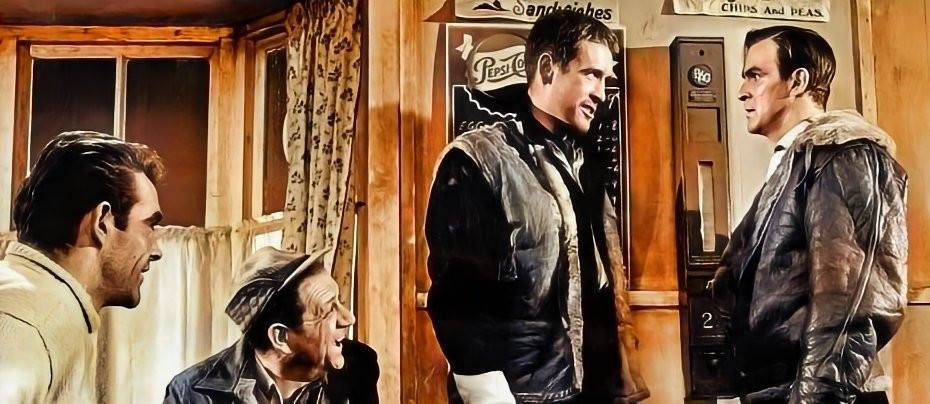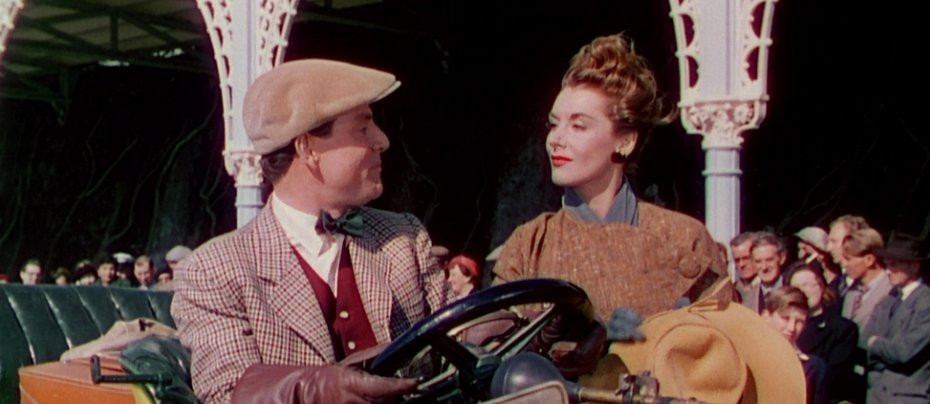
Genevieve - A British Classic
Genevieve (1953) – A Very British Film with Very British Attitudes
By Andrew Cobby
Whenever someone asks me favourite film I answer ‘Armageddon’. It isn’t – I’ve never seen the film - but it seems to satisfy the casual enquirer. If I am pushed a bit further and quizzed about my favourite bit I always say the part where Bruce Willis turns out to be dead all along. Just so you know - I haven’t seen that film either. Not much point really.
My real favourite film is Genevieve but I get a lot of blank stares when I tell people this. That’s why I fall back on Armageddon, Bruce Willis is such a good, bankable actor and most people have heard of him.
I first saw Genevieve in July 1982. I know this because it was being shown as a tribute to Kenneth More who had just died. Dinah Sheridan, the last surviving member of the main cast, gave a brief introduction.
It is one of the first films I taped on the VHS machine. Then I was given it as a Christmas present in 1984. It was an official VHS, with its own label and packaging. I am still annoyed that John Gregson, the driver of Genevieve, didn’t appear on the cover. The box had a picture of Kenneth More and Kay Kendall with Mr Gregson and Dinah Sheridan nowhere to be seen.
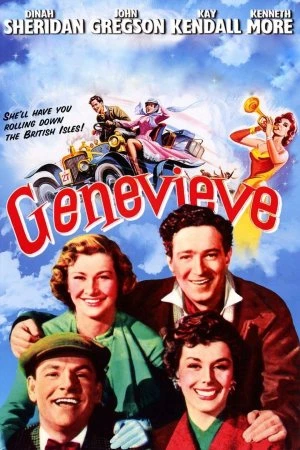
I was given the DVD of the film as a 40th birthday present a few years ago. Ms Sheridan is on hand again in the Extras section to give a commentary on the film. I was surprised that she referred to her co-star as ‘Gregson’. It seems that she warmed more to Kenneth. At least Mr Gregson managed to make it on the cover of his own film this time, the DVD box featuring an excellent depiction of Alan, Wendy and Genevieve in full throttle.
Made in 1953 and directed by Henry Cornelius, Genevieve is about the London to Brighton car rally. On the quiet, it also depicts how obsessive and competitive men are about things that don’t really matter at all, and how their womenfolk try to inject some sanity into the proceedings.
The gong announces the film as a product of the J. Arthur Rank Organisation but, if it were a painting, it would be styled as ‘after Ealing’. There is no reason not to describe it as a painting because it is a colour film and the colour is absolutely gorgeous. Whoever invented Technicolor certainly knew what they were doing.
Mr Cornelius also directed Passport to Pimlico so at least he had a couple of great films to be proud of before his early death at the age of 44 in 1958.
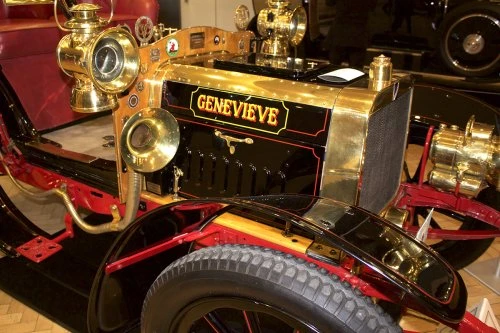
Genevieve is the name of a veteran car, a French-made Darracq driven by barrister Alan McKim, played by John Gregson. It’s probably best not to speculate as to why a grown man would name his car after a woman.
The rest of the main cast is fleshed out by Dinah Sheridan as Alan’s wife Wendy, Kenneth More as Ambrose Claverhouse (taking time off from the ‘tedious but lucrative’ world of advertising) and Kay Kendall as Rosalind Peters, Ambrose’s partner for the trip. Rosalind has brought Susie, a great, big beautiful mutt with her. Say how do you do, Susie.
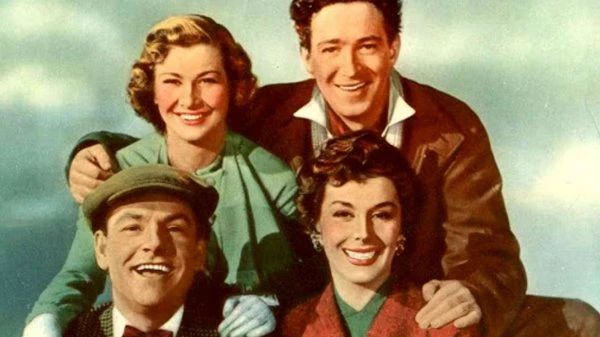
Alan’s wife Wendy is reluctant to go on the London to Brighton, preferring an evening spent at Tania’s cocktail party. Wendy has a point. I would much prefer getting outside a nice warming GnT instead of tootling along on a one hundred and eight mile round trip in an open top car at the mercy of the British weather. Not that Alan sees it that way.
He throws a bit of a tantrum when he realises that Wendy doesn’t want to go and threatens to make the trip on his own. Or, as my wife would put it, he threatens to cut his nose off to spite his face. It must be a male trait because I do that a lot, apparently.
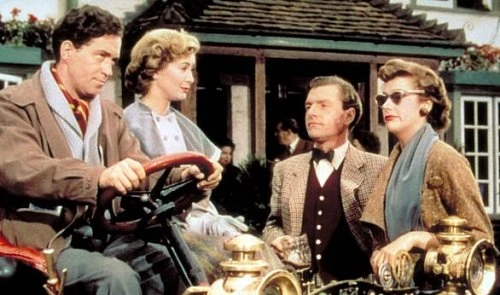
After some to-ing and fro-ing, the two men and their partners pootle down to Brighton, waved by broadcaster Leslie Mitchell. Poor Mr Mitchell joins the likes of Edgar Lustgarten and Gilbert Harding as well-known personalities of the time who are now almost forgotten.
The foursome are accompanied by Larry Adler whose jaunty harmonica provides a musical comment on events on screen. I wonder if Larry Adler gave his instrument a name and, if he did, I trust it wasn’t Our Monica. You’re better than that, Larry. I saw you on Parkinson and you were a very witty and entertaining guest.
The characterisations of the four lead characters are well-drawn. Alan mutters away to himself as he tries to negotiate married life. I wouldn’t have thought muttering would fall within the job description of a barrister but who am I to judge?
Ambrose is a hail-fellow-well-met sort of bloke but, with his Woody Woodpecker laugh, you get the impression that it wouldn’t take too much for him to give you a punch on the nose.
Alan’s wife Wendy is the sensible one, accepting of her husband’s fixation with Genevieve, and wishing for the run to be all over so that she can concentrate on adult life for the rest of the year.
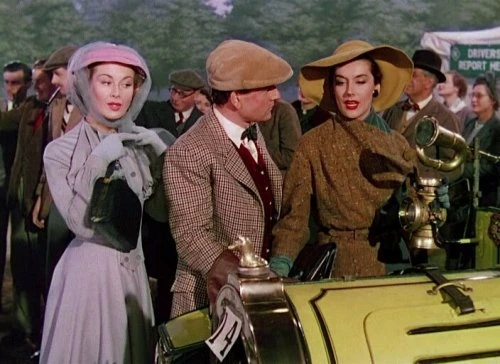
And then we have the surprising and wonderful Rosalind Peters. She is Ambrose’s partner for the run with whom he hopes to have a deep and meaningful one night stand during the halfway stopover in Brighton. Before we meet Rosalind, Ambrose rather ungentlemanly refers to her as a woman ‘in the broadest sense’. Well Ambrose, Rosalind is a woman and a lady, and she is far too good for a cad like you. She has the measure of Ambrose (and, no doubt, of all men), she loves dogs and she has an unexpected gift for music. What’s not to admire?
It is all unmistakably middle-class and there is nothing wrong with that. If you prefer your roads grittier you could always watch something like the equally excellent Hell Drivers. This is also about power struggles and hurtling down the Queen’s highways at breakneck speed but it is in black and white and stars the rough-hewn Stanley Baker.
To be honest, I wouldn’t fancy Alan and Ambrose’s chances against Mr Baker. He got the better of the hard as granite Patrick McGoohan in Hell Drivers and, armed only with Michael Caine and a few dozen rank and file, he took on and defeated a 4,000-strong Zulu army. Compared to these tussles, I don’t think he would have viewed two white-collar workers as much of a challenge.
When they get to Brighton, Alan and Wendy end up at a hotel that would make Fawlty Towers look professional. The landlady is played by Joyce Grenfell, who along with Leslie Mitchell is pleasingly billed as a ‘guest artiste’. She cheerfully recites the rules of the house, all of which are aimed at the convenience of the hotel and not of the paying customer. Wendy is understandably livid that there is no hot water available and makes her displeasure known to the landlady and anyone else within a one hundred yard radius.
Enter Edie Martin who wanders across the screen carrying a couple of bottles. Wendy gives her a look and then does a double-take as she spots the bottles. Witnessing Wendy’s outburst, she returns to ask the all-important question ‘Are they Americans?’ It’s fitting that the script was written by an American, William Rose. Mr Rose provides a shrewd understanding of how his fellow countrymen are viewed by the British, but I think I also detect irony at work here.
As an American he would have been perplexed that the British would put up with such poor customer service. In the UK, then as now, those who complain are the ones at fault rather than those who provide sub-standard wares. The joke here is on us mealy-mouthed Brits as much as it is on the loud-mouthed Yanks.
Edie Martin is usually unheralded, the best things are, and she can always be relied on to brighten up a scene. She even manages to steal this one from right under Joyce Grenfell’s nose. Well, call me Sausage.*
Ms Martin gives an equally good turn as the suspect’s mother in The Mysterious Bullet episode of Scotland Yard. She earns bonus points from me in this one by whimsically addressing the detective as ‘Mr Policeman’.
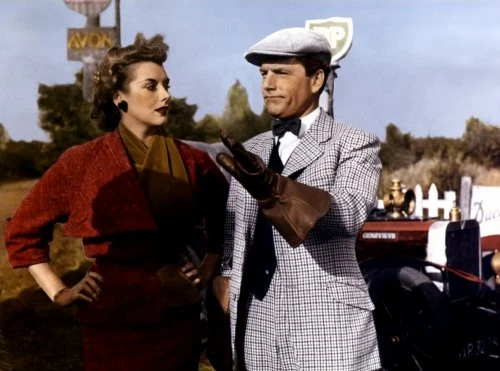
We join the bash in Brighton as it is winding down, or it may be just a moribund evening.
The waiters are yawning and the band are chugging along until they can strike up the national anthem and clear off home. The menfolk are dancing with their young ladies and whispering romantic talk of self-starters, carburettors and whipped crankshafts.
We can draw our own conclusions here. For the sake of relationships most of the ladies probably let it go in one ear and out the other. For those unable to do so the silver lining is that at least the men are not talking about football.
Rosalind is determined to make some entertainment of her own. 'I'll show them how to play the plumpet' she says as she strides confidently towards the stage to inject some life into the party.
She is as good as her word too, caressing the trumpet and coaxing some beautiful music out of it. I don’t know what the tune she plays is called but I have made up my own lyrics so that I can sing along to it. They go something like this: ‘Oh Genevieve, oh Genevieve, oh Genevieve, oh Ge – en – evieve’. They are not particularly adventurous lyrics but I think they manage to remain faithful to their subject.
Of course, Ms Kendall isn’t really blowing the horn. Kenny Baker is the one on the valves for this one, which makes me think that Eddie Calvert must have lost the toss.
It is shocking to think that Kay Kendall didn’t make it out of the 50s. She shuffled off her mortal coil in 1959 and the age of 32. Live life while you can, if you’re that way inclined.
After showing them how to play the plumpet, Rosalind collapses into her chair and falls asleep. As Ambrose rightly points out, she’s blotto. He won’t get his fumble in the back seat after all. He doesn’t vociferate this thought, but we all know what he’s thinking. Wendy certainly does and she starts to giggle uncontrollably. It is a very convincing and infectious giggle, too. In contrast to John Gregson’s rather forced chortle, her laugh sounds so real and natural that you think it must be genuine. Then you realise that she’s an actress, sorry, actor so it’s probably not and it’s all fake.
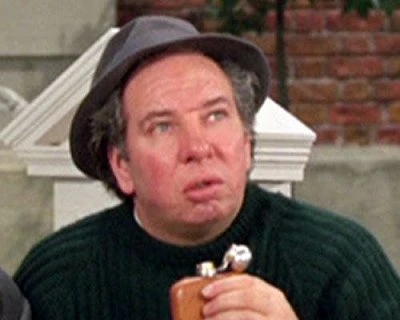
The band leader who reluctantly allows Rosalind to sit in with the band is played by Michael Balfour, he of the once-seen-never-forgotten face. It took me years to spot this but, if you look closely when he hands the trumpet to Rosalind, he manages to be in two places at once. This is a handy trick if you can pull it off. The things I would do if I could be in two places at the same time. Who am I kidding? I would just use it as an opportunity to put off twice as many things.
Mr Balfour has a sad, car-related story of his own. He was the passenger in the car crash that killed actor Bonar Colleano in 1958. I recently watched Mr Balfour in an episode of Dial 999, dating from around 1959, and it looked like he had scarring on his face that I presume was a result of the car crash.
Irritated by Ambrose's familiarity with Wendy at the party, frustrated by the events of the day and, who knows, just a little drunk, Alan demands to know what happened when Wendy accompanied Ambrose on the 49 run. That would be the London to Brighton of 1949, a time before Alan knew Wendy.
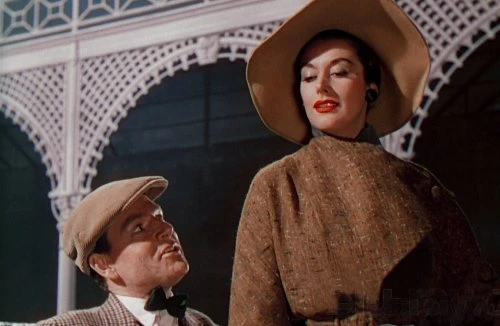
So, Alan is jealous of what his wife might have been up to before he met her. He has no evidence of any wrongdoing, or any reason to point the finger at all, but reason goes out the window when it comes to relationships. Alan is a barrister, for God’s sake, trained to deal with logic and to discard emotions, so what chance do us non-barristers have?
What happened on the 49 run is that she locked Ambrose out of her room but she’s not going to tell Alan that. No, she’s going to let him sweat for a while.
The return journey is taken at a more breakneck pace as the two friends become rivals and indulge in a bit of illicit road-racing.
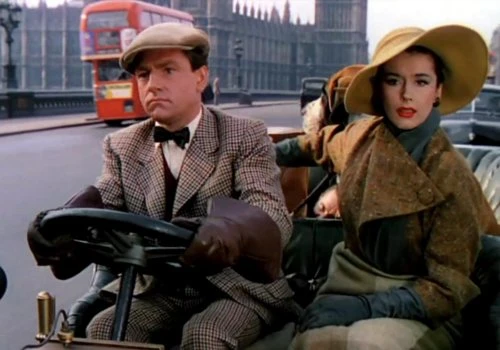
It’s Alan’s sexual jealousy, and some calculated needling from Ambrose, that prompt the race on the return leg to London. The first one on Westminster Bridge wins. Alan even puts up Genevieve as the stake.
There is a funny bit of dialogue in which Rosalind complains to Wendy that Ambrose only thinks about the car ‘and the other thing’.
‘Oh no,’ replies Wendy, ‘my husband only thinks about the car.’ I love everything about this line – the dryness of it is matched by Ms Sheridan’s delivery and is rounded off by Ms Kendall’s understated reaction as its full import sinks in. The line always makes me think of that adage that there are two things that a woman should never criticise a man about - and one of them is his driving.
But I am not sure if Wendy’s assessment is strictly correct because, if it were, Alan would surely have put her up as the prize instead of Genevieve. Regardless, Wendy manages to talk Alan out of it and he puts up £100 instead.
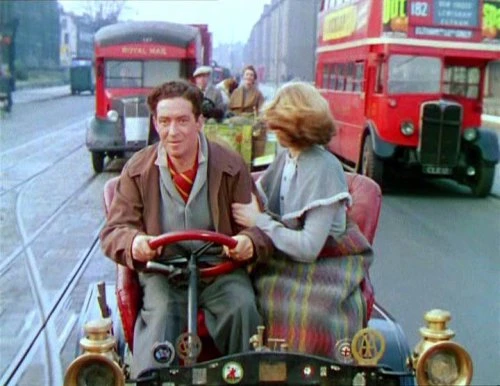
The film depicts a time before road-rage became so prevalent that it had to be given a name. Were we all more polite to each other then, or was it because there were fewer cars on the road? I think I’ll leave that conundrum to the likes of Top Gear.
When I was at primary school I remember watching a cartoon of Goofy as Mr Walker who changes into Mr Wheeler the moment he gets behind the wheel of his car. Think Dr Jekyll and Mr Hyde and you get the picture. I have since learned that the cartoon is called Motor Mania and was made as long ago as 1950. It is an apt double-edged title for a cartoon that most grown-ups could do with watching.
Whenever I watch Genevieve I wonder if I would feel at home in the England of 1953. I think I would probably feel like an alien trying to negotiate the pre-decimal monetary system and trying to think of ways to fill the long nights without television. I know that television sets existed at the time but I doubt that I would be able to afford one. Life must have been so boring. Things change, of course, and not necessarily for the worse.
On the return leg, Alan and Ambrose indulge in some aggressive driving tactics of their own. Sabotaging the other car, making false reports to the police and even falser reports that one of them has perished in a car accident.
It’s strange what being locked down can do. I started listening to Radio 3. I have no idea what’s going on when I tune in, having only recognised a handful of tunes since becoming one of its listenership, but it is refreshingly free from spoken drivel.
It was but a small step to start tuning in while driving and I find its melodious mix of music calms me down. If I can do something to make my time on the road less stressful for myself and other road users then I’m all for it. Having said that, I am yet to see how I will react when, as it surely will, the station gets round to playing the 1812 Overture.
It isn’t long before the pair’s erratic driving comes to the attention of two motorcycle policemen. I think they must listen to the Third programme before the start of each shift because they are remarkably patient in their dealings with the speeding veterans.
Patient or not, the lead policeman, played by Geoffrey Keen, finally loses his temper with the pair when they almost come to blows at the People’s Snack Bar.
‘I’m almost at breaking point’ says Ambrose to Alan. ‘Go on then, break’ says a disinterested bystander. There was obviously nothing on the wireless that evening and he has hit the streets to make his own entertainment.
It takes the beautiful, calming influence of Wendy to calm the pair down. She tells them in no uncertain terms how ashamed she is that they are reduced to ‘hawling like brooligans’. I feel for her here. Many is the time I have tried to sound authoritative and superior and my brain has refused to play ball.
Ambrose sees himself as a serious roadster. The viewer knows this because he wears those long leather driving gloves that make him look like he’s about to take something hot out of the oven.
He doesn’t say it but I think he is cross-eyed with envy at the policemen’s stylish black and white driving gloves. They put his serviceable brown pair to shame.
Speaking of driving gloves, when I was a kid there was a public information film, or pif, about the dangers of bad driving. A careless, impatient driver giving hassle to an old lady wishing to cross the road is contrasted with a thoughtful driver who patiently lets her cross. The two drivers work in the same office and their boss, watching events through his office window, asks his secretary who they are. ‘He’s going to get one’ she coos of Mr Careless. And the thoughtful driver? ‘He’s rather ordinary’ she laments. I am pleased to report that the boss ignores her opinions completely and gives Mr Thoughtful an immediate promotion. I don’t need to tell you which of the two drivers was depicted wearing driving gloves. Or perhaps I do, in which case it was Mr Careless.
Sometimes I think I have imagined that pif because I can’t find it on YouTube and no-one I have asked seems to remember it. I think David Simeon played the thoughtful motorist. He was great in End of Part One. I still have fond memories of his merciless impression of Derek Batey (‘That’s grand’) If you don’t know what I’m referring to, you should look it up. I don’t wish to sound patronising but Google really is your friend. I have never fallen out with it, although I confess to coming close when my search for that pif drew a blank.
I think the most unfortunate character in the film is J.C. Callahan, the kindly driver of the red sports car who volunteers to give Genevieve a tow. Alan thanks him by crashing into the back of him. When he understandably registers his disappointment, Alan and Ambrose shoo him away with a flea in his ear and a dent in his car. Only it’s not his car, it’s his wife’s and she won’t be best pleased when he reports back to her.
Mr Callahan is played by Reginald Beckwith who gives a memorable five-minute characterisation which is funny and sad at the same time.
The DVD has a gallery of ‘then and now’ photographs that show the changes that have taken place since the film was made. Most of the scenery is unrecognisable now but there are some buildings that remain. The People’s Snack Bar is still there and I couldn’t believe how thrilled I was to see in a ‘now’ picture the still recognisable gable end of a house at the far end of the mews in which Alan and Wendy live. Why, it is just like Wendy could, even now, appear from around the corner, laden with produce from the grocers and chide Alan with the delightfully archaic ‘You made me drop the eggs, that’s what.’
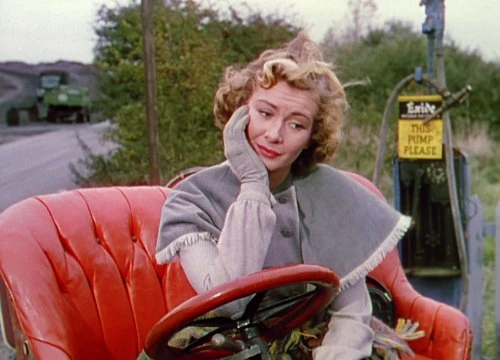
A former wife of Jimmy Hanley, Dinah Sheridan was the mother of Jenny Hanley who brightened up my tea-time viewing as a mainstay of the children’s TV magazine programme Magpie. I was a bit too young to appreciate the tenure of Susan Stranks.
I was always a fan of Magpie over Blue Peter. In some things, we don’t change at all. Even now when I meet someone approximately the same age as me I judge them according to what I imagine to be their magazine show of choice. I ask myself ‘Magpie or Blue Peter?’ and classify them accordingly. I don’t mean to be judgemental but I do a similar thing with those who say ‘haitch’ instead of ‘aitch’. I can’t elp it.
I suppose you could compare the trait to the still recognisable gable end at the far side of the mews, except that I am not as thrilled that this edifice is still standing.
Towards the end of the race, Alan shows that he has a heart after all by patiently listening to an old gent talking about Darracqs and reminiscing about proposing to his wife (1904, Pangbourne). He confides that she only accepted his proposal because of the car.
Meanwhile Ambrose, Rosalind and the unnamed Spyker speed past and look all set to win the race. The Spyker’s wheels become stuck in the tram lines and the car is led away from Westminster Bridge leaving Genevieve to stagger less than triumphantly over the finishing line.
Ambrose and Rosalind may see each other again. Who knows? What we do know is that Alan and Wendy will motor on happily until they hit the same bump in the road this time next year.
Genevieve tells a simple tale about relationships and what we have to do to keep them going. All involved know what they have to do and they do it expertly and without fuss.
The film has been with me since I was 16 and I can’t imagine my life without it. I realise that my account of events has taken many detours, driving down the occasional B road and maybe even hitting a dead end here and there. If you like, you could say that I have taken a trip from London to Brighton via Penzance. It’s what the film makes me think about and I go where it takes me. Besides, my years of watching Genevieve have taught me that it’s not the destination it’s the journey.
* Joyce Grenfell in The Happiest Days of Your Life. The character is a schoolteacher called Miss Gossage and, in an attempt to ingratiate herself with her pupils, she tells them to 'call me Sausage'.
Published on November 22nd, 2022. Written by Andrew Cobby for Television Heaven.


